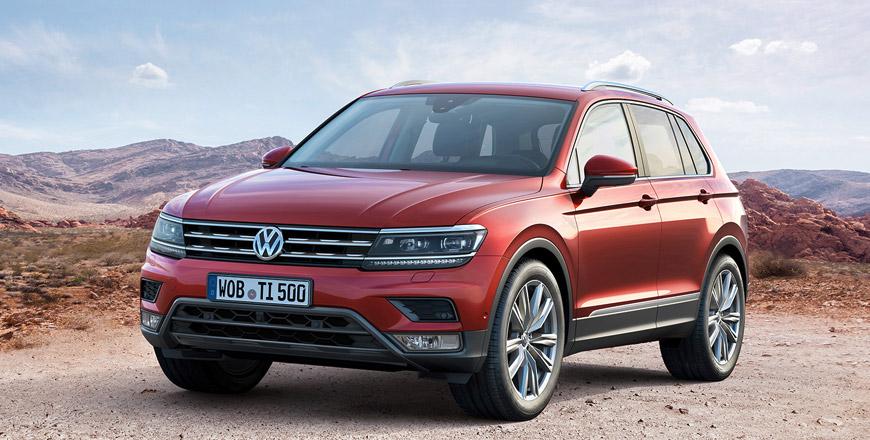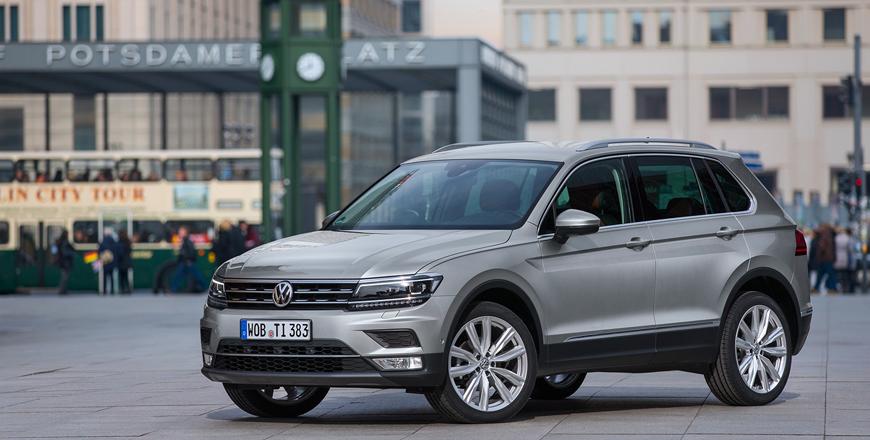You are here
Volkswagen Tiguan 2.0 TSI: Classy, composed compact crossover
By Ghaith Madadha - Oct 31,2022 - Last updated at Oct 31,2022

Photo courtesy of Volkswagen
First launched in 2016, the second generation Volkswagen Tiguan was a distinct step up from its predecessor. Only slightly larger, it was, however, a better designed, refined and equipped vehicle. Built on Volkswagen’s modular MQB platform that also underpins the Golf, the second generation Tiguan also delivered improved driving characteristics.
A classier and more upmarket effort, the Tiguan has since been lightly updated and subtly restyled for its 2020 mid-life face-lift, and features improved tech, lighting and infotainment systems.
Crisp and clean style
A mainstream compact crossover now imbued with premium flavours, the MQB-based Tiguan is slightly shorter, wider and longer than the original, and is available in standard and more spacious long wheelbase Allspace versions. The second generation Tiguan is an elegantly conservative and more contiguous design with an emphasis on straight lines and a perception of width. Handsomely mature is design, the Tiguan’s relatively level waistline and restrained rear pillar width lend it an airy ambiance and allow for good driving visibility.
Built with increased lightweight aluminium content for a 50kg weight reduction, the Tiguan features crisp and clean surfacing, with a sharply ridged crease running along its side towards dramatic, almost boomerang-style, rear lights, while a jutting tailgate spoiler lends a certain sporting style. Broader and more dramatic than its predecessor, the face-lifted Tiguan receives a higher bonnet line, wider grille and new bumper treatment. Its aggressively browed front lights are also redesigned and feature a new signature and LED elements.
Confident delivery
More visually assertive in R-line design specification with bigger bumper, broader side intakes and larger alloy wheels, the top-spec Tiguan available in the Middle East is powered by a transversely-mounted turbocharged 2-litre 4-cylinder engine.
Primarily driving the front wheels, but transmitting more power rearwards as necessary courtesy of its 4Motion all-wheel-drive system, the Tiguan 2.0 TSI channels output through a 7-speed automated dual-clutch gearbox (DSG). It meanwhile produces 177BHP at approximately 6,000rpm and generous 236lb/ft torque throughout a 1,500-4,000rpm band.
Capable and familiar, the Tiguan 2.0 TSI’s engine is responsive from standstill, with little of the spooling lag expected from turbocharged vehicles. Refined in operation and eager in delivery, the Tiguan’s power accumulation is underwritten by a generous wave of torque across a broad and easily accessible mid-range, for confident overtaking.
Reasonably brisk, it is estimated to dispatch the 0-100km/h benchmark in 7.7-seconds and onto a 208km/h top speed, while combined cycle fuel consumption is estimated at a moderate 7.4l/100km.
Quick and composed
Versatile in accelerating when cruising, the Tiguan’s engine is well complemented by its DSG gearbox’s broad ratio range in terms of performance and efficiency. The DSG is meanwhile quick and slick in executing shifts in a sequence, as it features two clutches for odd and even gears, whereby the next anticipated ratio is already lined-up and ready for seamlessly quick cog changes. Built primarily for road use, the Tiguan’s driving modes can leverage its gearbox response profile for modest off-road driving.
With generous 200mm ground clearance and stability and traction control-based off-road assistance features, the Tiguan’s all-wheel-drive system can also divert power to the rear wheels for added traction over loose surfaces. The Tiguan is meanwhile smooth and comfortable on road. Riding on MacPherson strut front and multilink rear independent suspension, the Tiguan delivers confidently comfortable highway stability, and good cabin refinement from noise, vibrations and harshness. The Tiguan’s vertical control is meanwhile comparatively well composed and settled over most dips and crests.
Smooth and spacious
Capable and confident, rather than outright exciting, the Tiguan’s dynamics are nevertheless reassuring, and it is tidy in, and through, corners. Not as agile as a Golf, the taller and heavier Tiguan is, however, nimble for a crossover and dispatches corners with comparatively nimble precision and only moderate body lean. Better absorbing road imperfections with smaller alloy wheel options, it can be slightly firm over sudden bumps and potholes when fitted with larger alloys. Steering is meanwhile light yet precise.
Inside, the Tiguan features a well-adjustable, supportive and comfortable seating position, and good road visibility for manoeuvring and parking. Classy, uncluttered and logical in presentation, the Tiguan features good build quality inside. Offering notably good space for rear passengers, for its segment, it also generously accommodates 615-litres luggage capacity, which expands to 1,655-litres with rear seats folded. Well-equipped with standard and optional features, the face-lifted Tiguan is available with digital touch panel controls, an improved infotainment system and digital cockpit instrumentation.
TECHNICAL SPECIFICATIONS
Engine: 2-litre, turbocharged, transverse 4-cylinders
Bore x stroke: 82.5 x 92.8mm
Valve-train: 16-valve, DOHC, direct injection
Gearbox: 7-speed dual clutch automated, four-wheel-drive
Power, BHP (PS) [kW]: 177 (180) [132] @4,000-6,000rpm
Specific power: 89.2BHP/litre
Power-to-weight: 107BHP/tonne
Torque, lb/ft (Nm): 236 (320) @1,500-4,000rpm
Specific torque: 161.3Nm/litre
Torque-to-weight: 194Nm/tonne
0-80km/h: 5.2-seconds (estimate)
0-100km/h: 7.7-seconds (estimate)
Top speed: 208km/h
Fuel consumption, 7.4-litres/100km (estimate)
Fuel capacity: 60-litres
Height: 1673mm
Wheelbase: 2677mm
Track, F/R: 1576/1566mm
Headroom, F/R (w/sunroof): 1004/967mm
Minimum ground clearance: 200mm (estimate)
Cabin width, F/R: 1503/1491mm
Luggage volume, min/max: 615/1655-litres
Kerb weight: 1650kg (estimate)
Steering: Electric-assisted rack & pinion
Turning circle: 11.5-metres
Suspension, F/R: MacPherson struts/Multi-link
Related Articles
A more upmarket successor to Volkswagen’s first compact crossover SUV – or CUV – endeavour, the second generation Tiguan is a classier desig
Launched globally in 2016 and arriving in the Middle East earlier this year, the second generation Volkswagen Tiguan’s physical growth may b
Launched as a 1998 model, Volkswagen’s first New Beetle was a pioneer of the “retro” car design trend, fashionable in the 2000s, and was followed by re-incarnations of the original’s Mini and Fiat 500 contemporaries.



















